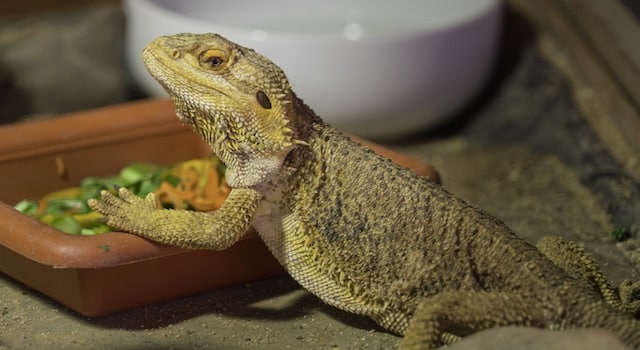
Introduction
Bearded dragons are popular pet reptiles native to Australia’s arid and semi-arid regions. They are commonly kept as beloved pets worldwide and are relatively easy to care for if you can meet their specific care requirements.
Establishing a proper feeding schedule is as important as a balanced diet. Feeding schedules typically vary according to a bearded dragon’s age, health, and the type of supplement used. Feeding them at the wrong times can interfere with digestion and nutrient absorption, so feeding according to a proper schedule is essential for their health and well-being.
Why a Feeding Schedule Matters
Bearded dragons thrive on consistency and the predictability of routines. A regulated diet is vital for preventing obesity and ensuring they receive the appropriate nutrients for their age.
Bearded dragons could either undereat or overeat if fed inconsistently, which can harm their health. They need a balance of protein (from feeder insects), fresh greens, and supplements (such as calcium and a multivitamin) for their diet to be complete. These foods should be offered according to a regulated feeding schedule set up according to their life stage. Generally, young bearded dragons under 12 months of age eat smaller but more frequent meals than adults. They also require a protein-rich diet to support their growth and development.
General Feeding Guidelines
- Synchronize Feeding with Heat and UVB Lighting: Synchronizing your bearded dragon’s feeding with heating and UVB lighting ensures optimal digestion and nutrient absorption. The heat and UVB lighting should be turned on at least an hour before you offer food in the morning and no later than an hour before the lights are turned off.
- Fresh Water and Salad Daily: You should offer your bearded dragon fresh water and a salad daily.
- Avoid Harmful or Toxic Foods: Avoid feeding harmful or toxic foods such as avocado, rhubarb, onions, garlic, citrus fruits, and fireflies.
- Offer Dietary Supplements: Calcium and multivitamins are essential for bearded dragons to ensure they receive the necessary nutrients that might be lacking from their diet. Calcium is vital for supporting strong bones and preventing metabolic bone disease (MBD), and multivitamins provide minerals and vitamins.
Feeding Schedules By Ages
Babies/Hatchlings (0-3 Months)
| Insects: | Three times daily for 5 minutes each. |
| Greens and Veggies: | Fresh salad daily, left inside for snacking. |
| Calcium Supplement: | Lightly dusted on insects once a day (first feed only). |
| Multivitamin: | Dusted on salads or insects once to twice every two weeks. |
Babies (3-6 Months)
| Insects: | Twice daily for 5 minutes each. |
| Greens and Veggies: | Fresh salad daily, left inside for snacking. |
| Calcium Supplement: | Lightly dusted on insects once a day (first feed only). |
| Multivitamin: | Dusted on salad or insects once to twice every two weeks. |
Juveniles (6-9 Months)
| Insects: | Twice daily for 5 minutes each. |
| Greens and Veggies: | Fresh salad daily, left inside for snacking. |
| Calcium Supplement: | Lightly dusted on insects once a day (first feed only). |
| Multivitamin: | Lightly dusted on salad or insects once every two weeks. |
Juveniles (9-12 Months)
| Insects: | 5-6 insects daily. |
| Greens and Veggies: | Fresh salad daily, three times larger than the volume of insects. |
| Calcium Supplement: | Lightly dusted on insects. |
| Multivitamin: | Lightly dusted on salad or insects once every two weeks. |
Adults (12+ Months)
| Insects: | 4-5 insects 2-3 times per week. |
| Greens and Veggies: | Fresh salad daily, left in the tank to snack on (one portion = size of a bearded dragon’s head). |
| Calcium Supplement: | Lightly dusted on insects. |
| Multivitamin: | Lightly dusted on salad or insects once every two weeks. |
According to a thesis conducted in 1971 by Judith Badham, bearded dragons should be eating a similar balance of insects and greens based on the following results:
- Juveniles: 37.1% plant matter and 62.9% insects
- Females: 68.6% plant matter and 31.3% insects
- Males: 83.5% plant matter and 16.5% insects
This is roughly 60-80% protein for babies, 60% for juveniles, and 15-30% for adults. A plausible reason females eat more protein is that they require extra nutrients for egg development.
This is based on the results of the data collected and discussed in a post by Dr. Johnathan Howard. The gradual transition to less protein is proportional to their growth rate. Adult bearded dragons need less protein and calories from insects than their younger counterparts but more greens.
Tips for Effective Feeding
- Monitor Portion Sizes: Ensure the insects are no larger than the space between a bearded dragon’s eyes to prevent choking or overfeeding.
- Grate Hard Vegetables: Use a grater for hard vegetables, such as carrots, to make them easier to eat.
- Adjust Feeding According to Life Stage: Adjust the balance of insects and greens and the feeding frequency based on growth and appetite.
- Gradually Transition Schedules: Transition between schedules as they age to avoid digestive issues or picky eating habits.
Common Mistakes to Avoid
1. Overfeeding Insects to Young Bearded Dragons
While it is true that young bearded dragons require more protein in their diet, overfeeding insects can still be harmful to their health. It could potentially lead to nutritional imbalances or digestive issues and contribute to obesity. Instead, you should follow a balanced feeding schedule that includes insects, vegetables, and dietary supplements in appropriate portions.
2. Offering Food too Close to Light-Out Time
Bearded dragons need external heat to digest their food, which they get from basking throughout the day. The basking lamp and UVB light should ideally be turned on for at least one hour before feeding them their first meal in the morning. This gives your bearded dragon time to warm up before eating and stimulates a healthy appetite.
Furthermore, you should feed them their last meal no later than an hour before the lights are turned off, with two hours ideal. If you feed them too close to light-out time, they might struggle to digest their food properly, leading to discomfort or potential nutritional imbalances over time.
3. Skipping Calcium and Vitamin Supplements
Another common mistake is to skip or exclude calcium and vitamin supplements from their diet. Bearded dragons can benefit from calcium and vitamin supplements and a balanced diet. The two main supplements you want to focus on are calcium and vitamin D3. Both are important for bone health and to prevent metabolic bone disease. Vitamin D3 is needed for calcium absorption, so the two supplements work together. Young dragons require calcium and vitamin supplements once or twice a week, and adults once every two weeks or as a veterinarian recommends.
Some recommended supplements include:
- Arcadia Earthpro-Ca
- Repashy Supercal
- Zoo med Repti Calcium
- Exo Terra Multi Vitamin Powder
Conclusion
Bearded dragons benefit from a consistent feeding schedule appropriate for their life stage. Ensuring they receive a balanced diet at the appropriate times in sync with heating and UVB lighting is essential. Young bearded dragons have slightly different feeding schedules than adults because they are in the growth and development stage of their lives. As they age, you should gradually transition their diets and monitor their appetite and weight to ensure the current feeding schedule works for them.



